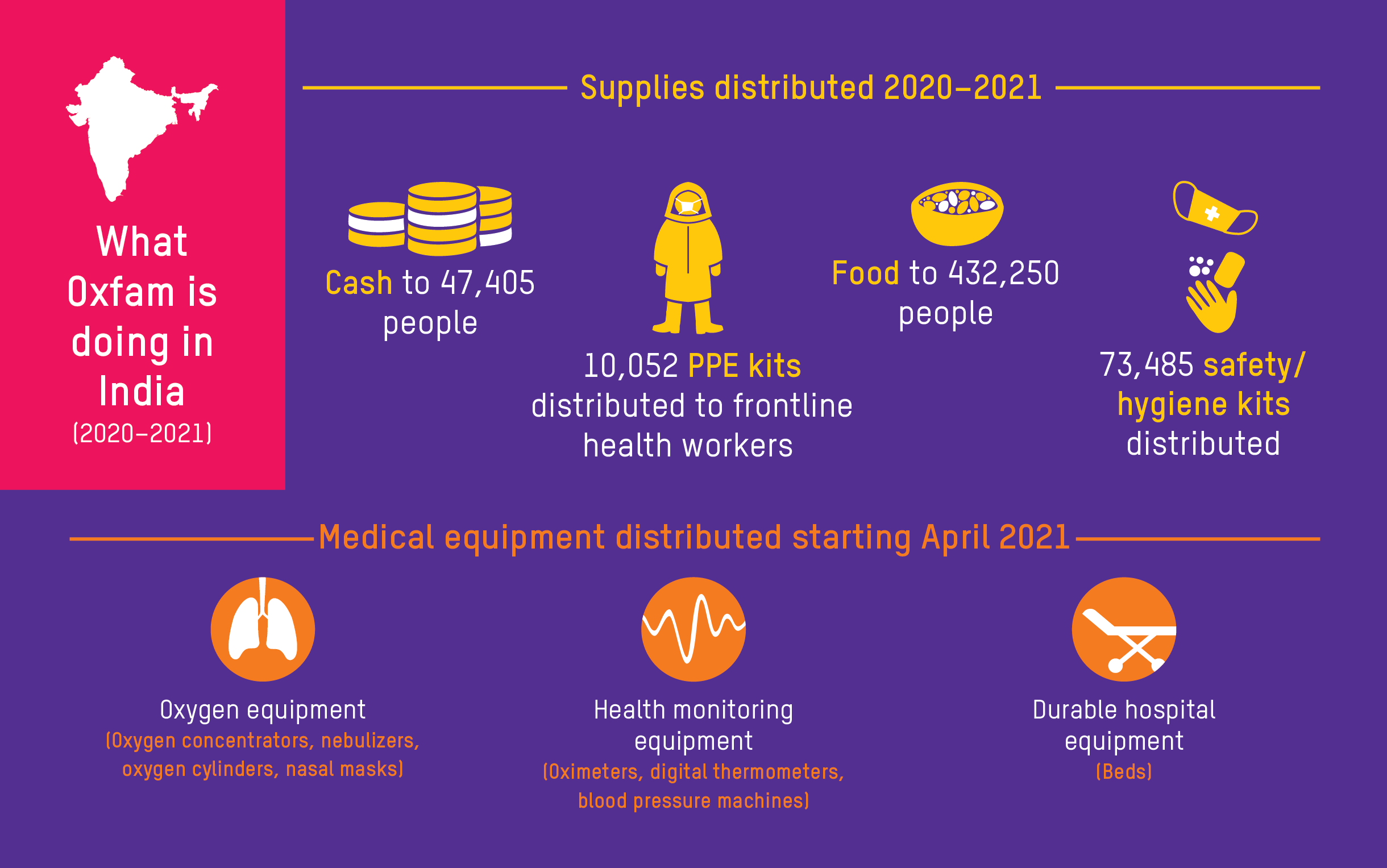Oxfam is building on its work over the past year to help the poorest and most at-risk people survive a second wave of coronavirus.
When the second wave of COVID-19 hit India in late April, it created a public health crisis that left hospitals overwhelmed and people literally dying in the streets. In less than a month, the country saw more than 100,000 deaths, bringing the total death toll to more than 300,000—the third highest in the world behind the United States and Brazil.
“I do not know of a single family that has not seen at least one of its members infected,” says Pankaj Anand, Oxfam India program director.
As we have seen in earlier outbreaks, the poorest people in India are disproportionately affected. Lower-caste Dalit people endure routine discrimination and face the highest risks, according to Alivelu Ramisetty, Oxfam America’s director of gender justice and inclusion. “They are suffering the most in the pandemic due to the pervasiveness of the caste system and poverty,” she says. “They have limited access to health care and other forms of social protection.”
Women are also experiencing greater risks in the pandemic. “Women are working as frontline health workers and care providers, and are facing a higher rate of infection—as much as two or three times higher,” Ramisetty says. “The pandemic has also affected their financial health, especially those working in the informal sector and at small businesses. Their duties to provide unpaid care to sick family members have increased.”
Oxfam is building on its work during the first COVID-19 wave to help migrant workers stranded far from home with no work, money, food, or public transport during lockdowns. We are continuing to provide cash, food, hand-washing facilities near transportation hubs, and safety kits containing face masks, gloves, hand sanitizer, soap, and other hygiene items to help people stay clean and avoid infection.
Oxfam is also helping people who have lost their jobs and homes. Many are members of minority ethnic groups, Muslims, people with disabilities, and women and girls, who are also facing a higher risk of domestic violence.

Assistance for hospitals and families
To help government hospitals cope with this deadly second wave, Oxfam is procuring and delivering medical equipment such as oxygen generators, thermometers, oxygen tanks and oxygen level meters, beds, and personal protective equipment (PPE) kits for frontline health workers. PPE kits distributed by Oxfam typically include full-body aprons, disposable goggles, head covers, disposable gloves, disposable shoe covers, face masks, and face shields. Oxfam is assisting hospitals in Delhi, Uttar Pradesh, Assam, Maharashtra, Bihar, West Bengal, and Chhattisgarh.
As people now out of work return from cities to their home villages, rural areas are becoming the next battleground in the war against COVID-19. Oxfam is working with 60 partners to provide hygiene kits as well as thermometers and oxygen level meters to families. “Our vast network of partners in rural areas will help us reach poor and marginalized people,” says Oxfam India CEO Amitabh Behar.
Advocating for better policies
In addition to providing material resources, Oxfam is urging the government of India to assist migrant workers returning to their homes with free COVID-19 tests, cash, shelter and isolation centers for those needing them, and stepped-up efforts to prevent violence against women.
Internationally, Oxfam is continuing to campaign for a People’s Vaccine that is free and universally accessible, without the burden of patents that increase the cost beyond the reach of poor countries. After India and South Africa proposed a temporary waiver of intellectual property rules for COVID-19 vaccines at the World Trade Organization, the US trade representative announced that she would support their proposal. If implemented, it would help share technology and license more factories to make the vaccines we all need to end the pandemic.
“The horrific situation in India is a warning to all of us,” says Abby Maxman, president of Oxfam America. “If we don’t move urgently to share the vaccine technology and scale up manufacturing so everyone, everywhere can have access to these lifesaving vaccines, we will never get the upper hand on COVID anywhere.”
